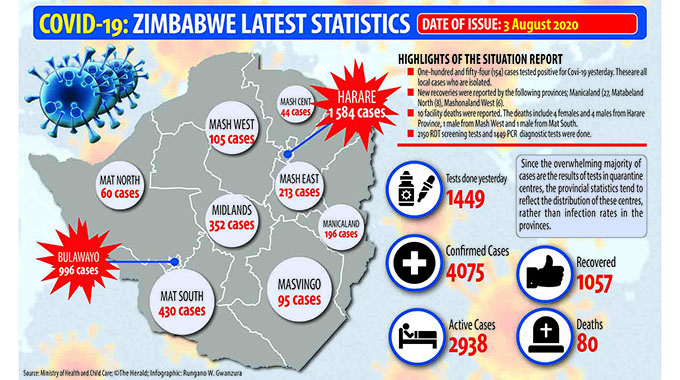
Elita Chikwati
Senior Reporter
Ten more Covid-19 deaths were reported yesterday, the second highest daily toll after 12 passed on last Thursday, taking the death toll to 80 while 154 new cases were confirmed, all local infections, taking the cumulative total to 4 075 and the number of local infections to 2 982.
Eight of yesterday’s deaths were in Harare health institutions, four men and four women, according to the daily Covid-19 report from the Ministry of Health and Child Care, with two more men dying in Manicaland and Matabeleland South.
Of the 154 local infections, 72 were in Harare, taking the city total to 1 299, with 39 deaths, almost half the total. Bulawayo saw 50 new cases, taking its total to 996 but with the death toll sitting still at 20, while Midlands, the third epicentre, saw eight new cases with its total rising to 245 with five deaths. Manicaland was worse, with 12 new cases, taking its total to 113, and it has now recorded six deaths.
Mashonaland East, which includes the satellite town of Harare abutting eastern and north-eastern borders now has 161 local infections, after four more yesterday. South Africa has recorded another 213 deaths in one day to take its total to 8 366 from 511 485 cases.
As a result of the surge in Covid-19 local infections, Treasury has allocated another $18,5 million for Covid-19 Rapid Response Teams as Government warns both public and private medical hospitals and clinics against refusing to admit patients who do not have Covid-19 test results.
Information, Publicity and Broadcasting Services Minister Monica Mutsvangwa yesterday said Government was concerned with the increase in Covid-19 confirmed cases over the past week, with the Sunday to Sunday figures almost doubling and local cases now forming almost all infections in the daily reports.
She said an analysis of Covid-19 hotspots continued to be made across the country to enable the channelling of required resources to these areas, especially fresh vegetable markets in Harare and Bulawayo.
“It was noted that persons from different environs visit these markets and testing would give an indication of infection rates.
“The Harare Rapid Response Teams conducted tests at Mbare Musika yesterday and today and of those tested, seven people (8,75 percent) were positive. It was also noted that there are high risks posed by these markets, which include crowding of clients, poor sanitation conditions for vendors and no easy donning of masks by the general public and vendors,” she said.
This errant behaviour in the form of continued disregard of Covid-19 containment measures, which includes physical distancing, wearing of face masks and sanitisation is also being witnessed in public spaces such as supermarkets, malls and banking halls.
“In light of the above, four additional Rapid Response Teams are now being established; two for Chitungwiza, one for Ruwa, another for Epworth.”
The four towns are all satellite towns of Harare sharing a border with the city, although Ruwa falls in Mashonaland East Province.
“Treasury has allocated Harare $10 million, Bulawayo $6 million and Chitungwiza $2,5 million for the Covid-19 teams especially for Rapid Response Teams.
“The Covid-19 war is now in our communities and we have to increase our vigilance and the need to adhere to protective and preventative measures cannot be over emphasised. The more we get into crowds, the more we expose ourselves to Covid-19,” she said.
Minister Mutsvangwa said the taskforce was informed that some private and public health institutions were refusing to admit patients who had no Covid-19 test results.
“This is contrary to provisions of the Public Health Act and Government warns those medical facilities who have been contravening this Act. All hospitals both public and private should admit all patients without the pre-requirement of a Covid-19 test and proceed to do a PCR test on admission. The latter will determine whether the patient will be further managed in the green or red zone,” she said.
The taskforce received a report that in light of the rising Covid-19 figures, which indicate increased risk in communities, the number of PCR tests done per week has doubled with average tests per day standing at 1 130 as compared to 559 from the week ending July 24, 2020.
“We will continue to increase our testing levels to ensure those who are at risk and have been exposed receive the medical attention they need. As such, the Ministry of Health and Child Care will be flighting a 72-hour tender on August 4, 2020, for the procurement of four PCR machines, 220 000 PCR test kits, 25 000 antigen RDTs and other laboratory consumables. The US$5,6 million already allocated by Government will be used for this procurement.
“To address testing backlog and delays in the issuance of test results, the taskforce was informed that laboratory staff at Mpilo in Bulawayo and St Luke’s in Lupane have been trained to use the Abbott Platform, which will assist in clearing the backlog at the National TB Reference Laboratory in Bulawayo. Meanwhile, an information technology solution on the issuance of results is being developed by the Ministry of Health and Child Care in collaboration with the Harare Institute of Technology to reduce the delays in the issuance of results,” she said.
Minister Mutsvangwa reminded the country that Covid-19 was real and people should not expose themselves through reckless and errant behaviour, which would not only expose them as individuals, but their loved ones as well and the nation at large.
On frontline workers, Minister Mutsvangwa said the taskforce received an update on the payment modalities for all allowances for non-health frontline staff, which are being finalised.
“The allowances will be paid according to the different risk categories, which are low, medium and high. The non-health frontline workers will receive their allowances backdated since they had not yet started receiving these. Embassy staff are to be also considered as frontline workers as they are involved in repatriations,” she said.
